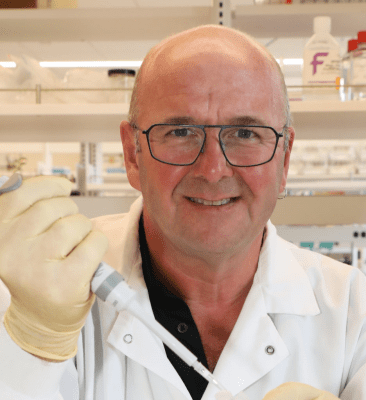Antibiotic-resistant bacteria pose a growing threat to food crops and livestock, but promising new methods to destroy them are being introduced by a synthetic biology researcher at Flinders University, who has been awarded a prestigious ARC Laureate Fellowship.
FAME Director, Professor Robert Edwards, has been appointed an ARC Laureate Fellow to progress research that will control phages – viruses that kill bacteria – using artificial intelligence to better protect crops, treat livestock and ensure that food being consumed by the public is safe.
 The Fellowship provides up to five years of support, including two post doctoral researchers and two PhD scholarships, and research funds of up to $300,000 a year—an ARC investment of almost $4 million that will enable Professor Edwards to pursue an ambitious, high impact research program that develops phages designed to destroy bacteria.
The Fellowship provides up to five years of support, including two post doctoral researchers and two PhD scholarships, and research funds of up to $300,000 a year—an ARC investment of almost $4 million that will enable Professor Edwards to pursue an ambitious, high impact research program that develops phages designed to destroy bacteria.
This groundbreaking project aims to reduce economic losses from antibiotic resistance and create new commercial opportunities in the global phage market by developing more sustainable agricultural and livestock practices.
Deputy Vice-Chancellor (Research) Professor Raymond Chan says the Laureate Fellowship is reserved for world-class researchers and this is Flinders’ first, and the only one for an SA researcher in 2025.
“This ARC Laureate is an incredible recognition of Professor Edwards’ leadership in his field of research that will benefit the agricultural industry, Australian farmers, and community health more broadly.
“Congratulations to Professor Edwards on this funding success and we look forward to witnessing the progress of this transformative project.”
Professor Robert Edwards says phages are used in Australia to prevent food and beer spoilage and protect crops from diseases, but AI can help design more powerful versions.
“The challenge with phages is that because their genomes are so small they evolve rapidly, and they look like
almost nothing else we’ve seen. We can address this by exploring their DNA fragments and using machine learning to understand what the DNA sequences are doing.
“This ARC Laureate will establish Australia’s first phage toolbox by taking advantage of recent leaps in AI capabilities. This process is unlocking the potential of phages by manipulating their genomes, identifying new protein functions, and controlling their interactions in microbial communities.
“Our goal is to create phages that save lives, treat livestock, protect our crops, and control environmental bacteria, making impactful contributions to the global antimicrobial resistance crisis.”
The Australian Research Council (ARC) today announced over $65 million in research funding for 17 Laureate Fellowships, to translate exciting new ideas into real outcomes.
Up to 17 Laureate Fellowships are awarded across Australia each year, underscoring the significance of this achievement.

HAVE YOUR SAY